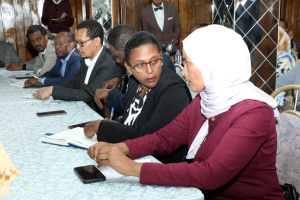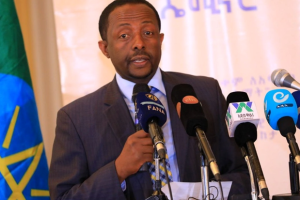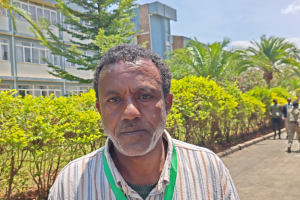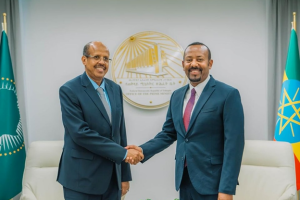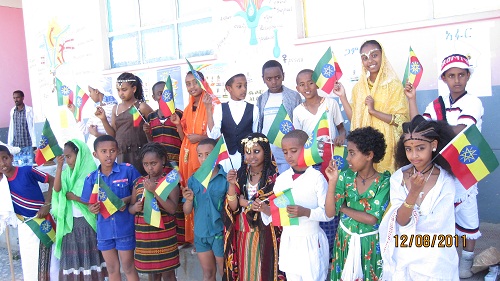
Before the reform Nations, Nationalities and Peoples day was being marked across the country for window dressing unity in diversity and marking the effectuation of the constitutional rights of Ethiopians.
The day was celebrated predominantly in a wide spectrum of primary and secondary schools.
Though people were aware of the fact that the whole thing was getting off the unity track and achieving the desired goal was not as easy, the day was also marked colorfully in a wide-array of higher learning institutions and governmental organizations. What should be the way forward?
The regime was upholding the ‘I’ mentality than ‘we’ in the midst of the students and the people of Ethiopia, who had been living for centuries under the umbrella of love and unity.
Teacher Belay Eshete is a teacher of Civics and Ethical education. He said, “Though Nations, Nationalities and Peoples day was celebrated in many shapes and forms across the country, people pose a number of questions pertaining to its significance in creating a sense of oneness within Ethiopians.
Most people argue that in order the country achieve the intended target the celebration of the day must be fashioned in a way that does not create a sense of rivalry amongst Ethiopians.
He went on to say, year on year, we marked Nations and Nationalities day in thought-provoking ways. Often, students adorned themselves with attention-grabbing traditional clothes of their choice. Parents also used to actively participate in terms of fulfilling what their children asked. As it is a day of merry-making, we did not interfere in students’ choice and nobody would be down in the dumps. During the day, apart from reflecting their traditional foods and clothes prepared in their respective homes, children spoke a spectrum of languages representing their respective ethnic groups.
“ Before the reform, the focus of the celebration focused on the different Nations, Nationalities and Peoples of Ethiopia. It did not attach significance to oneness.
The word ‘Ethiopia’ had no room. The government was fully focusing on dividing than uniting. Even worse, “We were coerced to tout the history of combatants as if they were the only people who saved Ethiopia and allowed the budding of democracy across the country!”
Honestly speaking, “We did not achieve success given that students were losing interest in the Civics and Ethical education time and again. We were not allowed to teach anything which could create a sense of oneness given that it did not help the regime prove successful,” he concluded.
He also said we were being accused by officials of Ministry of Education for not teaching responsibilities and unity solely focusing on rights and individuation.
Social psychologist Abebe Fanta for his part said, “To create a sense of oneness amongst students, we do need to nurture students with unity in diversity early in their formative years. We must not focus on individualism remiss in giving due emphasis to the big ‘stem’, Ethiopia.”
Teachers and parents should help students internalize the history of Ethiopia and its greatness so that they can familiarize themselves with the nitty-gritty of Ethiopia very well and distance themselves from hatred.
“Before students commemorate Nations, Nationalities and People’s day, they should discuss the significance of Nations and Nationalities day. Besides, in the form of folktales we must teach students about the different ethnic groups of Ethiopia. We must tell them that Ethiopia is a unique country. We have to hammer home Ethiopia is advantageous,for having over 80 ethnic groups.
A case in point, if one goes to China one comes across one people and one language and the same goes for England. Therefore, we must tell students the fact that having a mix of Nations and Nationalities and Peoples of Ethiopia is an opportunity for the country,” he wrapped up. be fashioned in a way that does not create a sense of rivalry amongst Ethiopians.
He went on to say, year on year, we marked Nations and Nationalities day in thought-provoking ways. Often, students adorned themselves with attention-grabbing traditional clothes of their choice. Parents also used to actively participate in terms of fulfilling what their children asked. As it is a day of merry-making, we did not interfere in students’ choice and nobody would be down in the dumps. During the day, apart from reflecting their traditional foods and clothes prepared in their respective homes, children spoke a spectrum of languages representing their respective ethnic groups.
“ Before the reform, the focus of the celebration focused on the different Nations, Nationalities and Peoples of Ethiopia. It did not attach significance to oneness. The word ‘Ethiopia’ had no room. The government was fully focusing on dividing than uniting. Even worse, “We were coerced to tout the history of combatants as if they were the only people who saved Ethiopia and allowed the budding of democracy across the country!”
Honestly speaking, “We did not achieve success given that students were losing interest in the Civics and Ethical education time and again.
We were not allowed to teach anything which could create a sense of oneness given that it did not help the regime prove successful,” he concluded.
He also said we were being accused by officials of Ministry of Education for not teaching responsibilities and unity solely focusing on rights and individuation.
Social psychologist Abebe Fanta for his part said, “To create a sense of oneness amongst students, we do need to nurture students with unity in diversity early in their formative years. We must not focus on individualism remiss in giving due emphasis to the big ‘stem’, Ethiopia.”
Teachers and parents should help students internalize the history of Ethiopia and its greatness so that they can familiarize themselves with the nitty-gritty of Ethiopia very well and distance themselves from hatred.
“Before students commemorate Nations, Nationalities and People’s day, they should discuss the significance of Nations and Nationalities day. Besides, in the form of folktales we must teach students about the different ethnic groups of Ethiopia. We must tell them that Ethiopia is a unique country.
We have to hammer home Ethiopia is advantageous,for having over 80 ethnic groups. A case in point, if one goes to China one comes across one people and one language and the same goes for England. Therefore, we must tell students the fact that having a mix of Nations and Nationalities and Peoples of Ethiopia is an opportunity for the country,” he wrapped up.
Herald December 9/2018
BY ADDISALEM MULAT


